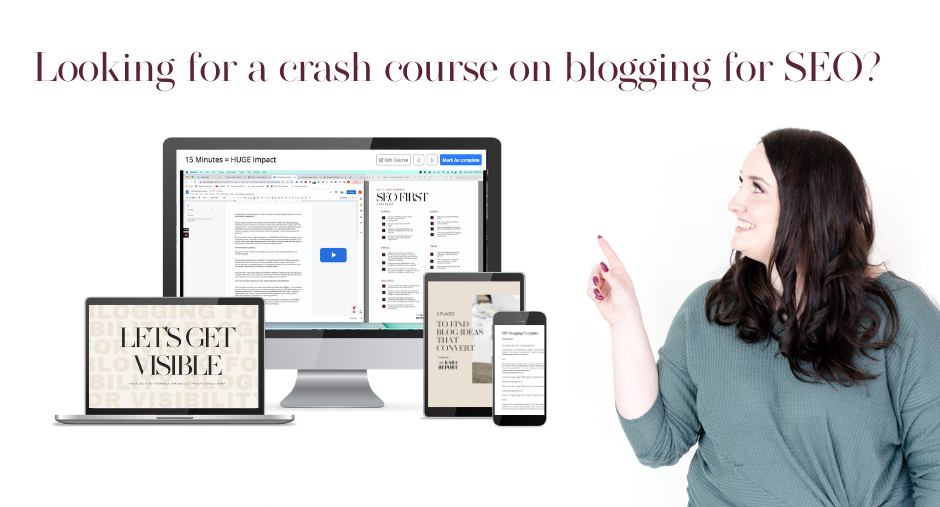What’s the point of blogging if you’re not being found on Google? Okay, I am obviously a blogging stan, so I could go on and on about the benefits of blogging beyond SEO, but the truth is SEO is probably the biggest reason you’re reading this right now. After all, you want to be found on Google. That’s kind of the whole point. So today – I’m sharing how to get your blog posts ranking on Google.
Today we’re going to talk about blogging and ultimately: how do we know if our time spent blogging is paying off? How do we know if our blog posts are ranking on Google and what are we supposed to do if we can clearly see that they are not ranking?
I cover everything you need to know about blogging for SEO in my Blogging for Bingeable Brands mini course, which you can get 20% off with code Podcast 20, but today, I want to talk about four ways to make your blog posts more findable and how to keep track whether or not they’re ranking at all. If you’re spending literally any amount of time or money on your blog posts or SEO, this is a MUST listen!
Listen on Apple | Listen on Spotify
Table of Contents
“My Blog Posts Aren’t Ranking On Google” 😱
OK – diving right into it, the craziest thing happened last month. I have started working with TWO new clients who had been blogging regularly before they hired me. One of them has even hired a professional blogger before! My first step was “catching up” and seeing how the website ranked, and when I checked their most recent 10-20 posts, not a single one of them had been indexed. Their blog posts ranking was ZERO.
So literally their time and money were being completely wasted. So… I knew I needed to record an episode about getting blog posts ranking. Today, I’m going to talk about why their posts weren’t ranking and what we can do about it. A good blogging strategy is a mix of making sure your blog posts are findable for Google and then also actually looking at the data.
I think as busy business owners, we have limited time. So with our marketing time, we just focus on creating more and more and more… even though we know that’s not what we should be doing. So yes – you DO need to look at the data. But I’m going to walk you through it all today!

Get Google Search Console To Track Blog Posts Ranking
I can’t tell you how many times a day I hear ONLY about Google Analytics. When GA4 came out, that was all anyone was talking about and Google Search Console always feels like the little lesser-known brother. Let me just say: it is the MOST valuable free SEO kind of resource we have at our disposal. It’s so easy to set up, slightly more difficult than Google Analytics, but it is a one-time, “set it and forget it”.
Even if you’re DIYing your blog posts, you are still investing in it. It’s an investment of your time, even if you’re not spending any money on it, and you do want to look at this data when you’re in Google Search Console.
What I look at:
- Overall impressions
- Overall clicks
- Overall CTR (click-through rate)
- The CTR of individual keywords and posts
- Top ranking keywords
- Top ranking pages
And listen – there’s likely a ton of things that you can track, but ultimately I find sometimes people go so overboard with tracking because it makes you feel like you’re being productive. ONLY TRACK DATA YOU ARE GOING TO USE. But do track your blog posts ranking.

How to Tell If Your Blog Posts Are Ranking on Google
Every single time I write a blog post, I take the new URL, and I paste it into Google Search Console and it will say, “URL not found”. Obviously, because I just hit publish a minute ago. Then, I hit request indexing. That little boost gets your blog post immediately on Google’s radar. It doesn’t mean it’ll happen the same day or anything, but at least Google becomes aware of it immediately versus just kind of stumbling upon it the next time Google finds your website. So, if your goal is to write blog posts that get found on Google, definitely add this to your blogging workflow.
Then at the end of the month, I’ll go back to Google Search console. I’ll try searching those URLs again and make sure that I get the shiny green check mark that says “URL is on Google”.
But here’s the thing (and this is kind of the point of the episode), what if it still says “URL not indexed”?
If it says URL not indexed, I will scan below and then you can see if Google has just not found the post yet, in which case I would just request indexing again OR sometimes it will say “discovered but not indexed”. Neither of those are great because the only great answer is “URL is on Google”. But if Google has discovered your content and not indexed it, that means that we likely need to make some improvements, which again, are the four things we’re going to talk about today to make sure that more people can find your blog post on Google.
1. Add More Content
So first, add more content. Okay? This is not the easiest, shiniest, sexiest thing to recommend, but the truth is, if Google is not ranking your posts, and you want to get your blog posts ranking, a larger word count might be required. So for something like “watercolor dog portrait artist”, you are going to be able to get away with a shorter word count for blog posts than somebody who is an “online business coach.”
The more competitive your keyword is, the more words or “value” you are going to need to bring. So if you’re finding that your blog posts are discovered and not ranked, I usually like to start by adding more content even though it’s not the “easiest” one.
2. Add More Internal Links
Google loves to be a resource for people. It wants to make sure that when you sign on to Google, it’s connecting you with the best answer. And when you think about yourself as a user, what is the best answer? For me, if I’m Googling, “dinosaur 2-year-old birthday party ideas”, what is the best answer for me? Maybe it’s like a mommy blog that’s like, “Hey, here’s exactly how to plan a two year-old’s birthday”, or “these are themes you might want for your two year-old’s birthday”.
THEN, when I’m on that page, it’s saying, “Hey, has your two year-old hit these milestones yet?” or “check out the best snacks for two year olds.” It’s reminding me of other content on the website that they’ve already created that is highly interesting to me which makes the overall post MORE valuable to me as a user.
So if you want to increase the value of your blog post, sometimes it is as simple as linking to more of your content. If somebody’s interested in XYZ, they’re likely also going to be interested in these posts. It can be linked throughout your blog post or even within the format of your blog post itself. You don’t want to be spammy and over the top with it, but in general, Google will appreciate this.
3. Consider Adding Video Content or Podcast Audio
This is more of a commitment, but if you are creating this kind of content anyway, it can be a really good idea because it increases page view time. For example, I added my podcast audio above. I could also add a video where I walk through the 4 things you need to do to get your blog posts to rank on Google. I could also create just a short two minute video on how to set up Google Search Console or how to submit your blog posts for indexing. All of these would increase the chance I have to get my blog posts ranking.
4. Update the Meta Title and Meta Description
One of the things I mentioned earlier when it comes to tracking your progress is to look at the click-through rate on individual posts and keywords. When you sign on to Google Search Console, it gives you an overall number or total impressions, total clicks, and your click-through rate. I don’t particularly care about that click-through rate because to me, there are keywords I “rank” for that I don’t care about at all.
I’m going to use my wedding planning business as an example. If my click-through rate is 0.5%, but then I find that I’m being found a lot for keywords like “wedding planning in Florida” and we don’t plan weddings in Florida, then I don’t particularly care that I was found or clicked on for that keyword.
That being said, when you keep scrolling on Google Search Console, you see the individual keywords, and if one of those keywords is “destination wedding planning for Canadians” and my click-through rate is 0.5%, well I definitely DO care that that click-through rate is low. So in that case, I like to update the meta title and meta description. If nobody is clicking on your listing, it means that that is not enticing enough.

Get Your Blog Posts Ranking on Google
If you’re finding your blog posts are not getting found on Google, now you know how to double check. I personally like to check this once a month (depending how often you’re blogging). Add this into your Clickup or Asana so you remember to do it.
Google Wants to Rank GOOD Content
I want to close out this episode by also saying, Google loves good content. We aren’t talking today necessarily about how to make your blog posts better because the assumption with these tips is that your content is already good.
When is the last time you’ve searched for something on Google and the page one spot one result was terrible? It just doesn’t happen very often. And yet, sometimes we kind of race to throw up this 200 word blog post that we spent 15 minutes on it and then we’re mad that it doesn’t rank.
Then here we are saying “but I followed SEO, I got the green Yoast SEO light.”, but the truth is that a green light is great, but it’s not enough. If your keyword is something like “marketing”, you could get a green Yost SEO score for a 300 word blog post. It doesn’t mean you’re going to rank, it just means you’re following some of the best practices. So you do want a green Yost SEO score, but that is not the only thing that you need.
These 4 tips really are centered around assuming your content is already good. So if you are doing this and then you’re even doing these four tips that I’ve given you, and Google keeps finding your blog posts and is listing them as “discovered, but not indexing”, it’s a pretty clear sign that Google doesn’t think it’s valuable. So look at that. How can you make it more valuable for the people that you want to find it?

I Cover More Of This In My Blogging for Bingeable Brands Mini Course
Again, I cover this in so much detail in my mini course, Blogging for Bingeable Brands. I have an SEO FIRST acronym for the five categories of what you need to do to get your blog posts found on Google so that they can start making more sales for you.
LINKS MENTIONED:
- Hire us to write SEO-drive website copy for you (and make more sales from your website!)
- Join Blogging for Bingeable Brands (Use Code PODCAST20 for 20% Off!)
- Sign up for Google search console
- Learn more about working with our marketing agency here
- Follow me on Instagram